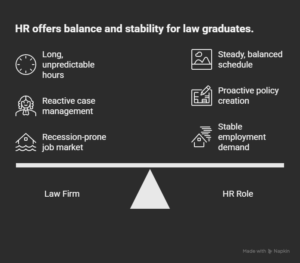Table of Contents
Imagine finishing law school with a knack for solving disputes and understanding rules. Now picture using those skills to shape workplaces, build teams, and create fair systems. That’s the power of an HR career for law graduates. It’s not about endless legal briefs. It’s about real impact. This guide explains why HR fits law grads perfectly. It covers skills, paths, education, starting steps, pay, growth, and challenges. With demand for HR pros rising 7% last year and more growth expected in 2025, your JD opens doors to a rewarding field. Dive in to see how.
Looking for a HR Management Course? Click here to enrol for Entri’s HR Management Course!
Why HR Fits Law Graduates
HR draws law graduates for clear reasons. Law school builds strengths that match HR needs. Employment laws, like those on wages or safety, fill your classes. HR applies them daily. Spot a hiring risk? Fix it fast. Companies avoid lawsuits with your knowledge. Unlike law’s long hours, HR offers steady 40-50 hour weeks. One grad left a firm for HR compliance and found better sleep while leading teams. HR also brings purpose. Instead of reacting to cases, you create policies that prevent issues. Training staff or shaping culture feels lasting. Data shows 53% of firms plan HR hires in 2025, especially in tech and healthcare. Your legal edge shines there. Variety keeps work fresh—meetings, training, audits. No day repeats. Plus, HR stays stable. Recessions hit law firms hard, but companies always need people pros. One lawyer turned HR director said, “I swapped stress for strategy. Now I solve issues before courts do.” That’s the pull. HR turns your training into impact with balance.
Key Law Skills That Boost HR
Law school sharpens tools that fit HR like a glove. Analysis tops the list. You dissect cases for flaws. In HR, you audit policies for risks. Catch a bias in hiring? Fix it early. Research skills transfer too. Statutes teach you to dig deep. HR uses that for compliance checks. A new labor law hits? You find it, explain it, apply it. Communication matters. Briefs demand clear words. HR needs the same for memos or training. Negotiation, honed in settlements, resolves workplace disputes. Ethics from law oaths guide tough HR calls, like handling sensitive data. Detail work, critical for contracts, ensures accurate benefits forms. Public speaking from court prep helps you lead boardroom talks. Time management, learned under case deadlines, tackles HR’s busy tasks. One grad noted, “My legal research stopped a firm’s lawsuit. Now it’s my daily tool.” These skills make you ready. In interviews, tie them to HR: “My case prep mirrors policy audits.” Pair logic with empathy, and you stand out. These tools grow with you, from entry roles to exec spots.
Become an HR Expert – Enroll in Our HR Management Course Today!
Unlock the secrets to effective Human Resource Management with our expert-led course! Learn recruitment, employee relations, performance management, and more to build a thriving workplace. Start your journey toward a successful HR career today!
Know MoreHR Career Paths for Law Graduates
HR offers diverse paths for law grads. Compliance officer fits best. You ensure firms follow labor laws, review contracts, and train staff. Your JD accelerates your rise. Labor relations specialists handle union talks and grievances, using your bargaining skills. Recruiters with legal know-how screen candidates and draft solid offers, popular in tech. Benefits managers navigate tax rules for perks, ideal for healthcare firms. Training coordinators teach ethics and skills, leaning on your speaking experience. Diversity officers craft inclusion plans, using equity law knowledge. HR generalists cover hiring to exits, a great entry point. Higher up, VPs shape talent strategy. One path: Start as a generalist, move to compliance, then aim for director. Another: Focus on relations, lead negotiations, become chief negotiator. Industries vary—law firms, banks, nonprofits all need HR. Global roles blend laws across borders. A lawyer joined a tech firm as a recruiter and became HR head in two years. Entry roles like assistant teach basics. Mid-level analysts crunch turnover data. Senior partners advise C-suites. Freelance consulting on compliance offers flexibility. Pick a path by passion—rules for compliance, talks for relations. Your skills fit them all.
Education and Certifications to Stand Out
A JD gives law grads a head start in HR, but certifications add polish. The SHRM-CP covers talent and ethics basics. It’s entry-level, and online prep fits school schedules. Law grads pass easily. The PHR focuses on operations and laws, where your knowledge shines. Recert every three years. HR Law Certificates from Pitt or Northeastern dive into employment rules with short, online programs. Albany’s Advanced Certificate builds leadership, pairing law with policy. USC Gould’s compliance certificate hones mediation skills. A Master of Legal Studies in HR from Miami or Tulane adds strategic depth with part-time options. Certs signal readiness—employers scan for them. One grad landed a role after earning SHRM-CP. Study for two months, test online, and spend $300-500. Take labor law electives in school and join HR clubs. Free Coursera audits on talent management fill gaps. For advanced roles, an LLM in HR Law from Albany boosts leadership. Certs raise pay 10-20%. Pair a JD with SHRM-CP for a strong combo. New AI ethics modules hit in 2025, so start now to stay ahead.
Steps to Launch an HR Career
Starting in HR as a law grad takes clear steps. Build a resume highlighting law skills. Tie analysis to policy work. List internships. Network through SHRM chapters or LinkedIn. Chat with HR pros at local meets. Apply for entry roles like HR assistant or coordinator at midsize firms—they train newbies. Volunteer with nonprofits to draft policies and build a portfolio. Grab a SHRM-CP to show readiness. Tailor applications: “My contract review fits your compliance needs.” In interviews, share stories: “I mediated a team dispute in clinic.” Start as a paralegal in HR if needed—it bridges to full roles. One grad skipped the bar, took an assistant job, and got promoted in six months. Shadow seniors on the job. Ask questions daily. Read HR Dive for trends. Find a mentor for coffee chats. Intern in corporate HR during school for real experience. Freelance by reviewing startup policies. Apply weekly and follow up politely. If rejected, refine your pitch—law resilience helps. Use Indeed for jobs and Glassdoor for insights. Your legal smarts give an edge. Land that first role and grow.
Become an HR Expert – Enroll in Our HR Management Course Today!
Unlock the secrets to effective Human Resource Management with our expert-led course! Learn recruitment, employee relations, performance management, and more to build a thriving workplace. Start your journey toward a successful HR career today!
Know MoreSalary and Growth Potential in HR
HR pays well for law grads. Entry-level assistants earn $50k-60k. Generalists hit $70k fast. Managers average $115k with 10-20% bonuses. Compliance roles top $114k, boosted by your JD. Directors reach $150k, and VPs hit $200k in big firms. City matters—New York adds 20%. Five years of experience lifts pay 30%. In 2025, HR jobs grow 8%, driven by skills hiring and AI oversight needs. Nearly half of firms plan project-based HR hires. Perks like health plans and flex hours sweeten deals. One lawyer turned HR pro doubled pay in three years with less stress. By 2030, HR lead demand doubles, and law grads lead the charge. Negotiate offers, citing your JD, and aim 10% higher. Annual reviews and certs boost pay. Tech firms pay top—$130k for managers. HR stays stable, dodging layoffs. Your future holds steady climbs, solid cash, and real growth.
Overcoming HR Challenges as a Law Grad
HR brings challenges, but law grads can tackle them. Legal habits clash with HR’s harmony focus. Shift from arguing to team solutions. Laws change fast—track them weekly via DOL alerts. Firing decisions hit emotionally. Build resilience through peer talks. Workloads spike with deadlines. Use lists to prioritize and delegate. Bias risks skew calls—seek diverse input and train on it. Doubt about fit nags. Test HR with internships to gain confidence. Overthinking traps law grads. Simplify decisions for outcomes. Missing a rule can spark lawsuits. Double-check work and consult experts. Burnout looms—set firm boundaries. Journal wins to stay confident. Networks ease struggles—join groups to share tips. AI ethics add new pressure in 2025—study them fast. Your law grit turns hurdles into steps. Keep moving, and challenges fade.
Looking for a HR Management Course? Click here to enrol for Entri’s HR Management Course!
Conclusion
A law degree unlocks a strong HR career. Your skills transfer smoothly. Diverse paths excite. Pay rewards effort. Growth awaits in a rising field. Start with certs, network widely, and take entry roles. Challenges exist, but your training overcomes them. HR offers purpose—shape workplaces, lead change, solve problems. The demand is here. Make the move now. Your JD sets you up to thrive.
Become an HR Expert – Enroll in Our HR Management Course Today!
Unlock the secrets to effective Human Resource Management with our expert-led course! Learn recruitment, employee relations, performance management, and more to build a thriving workplace. Start your journey toward a successful HR career today!
Know MoreFrequently Asked Questions
Can law graduates really succeed in HR without HR-specific experience?
Law graduates enter HR with a strong base. Your JD covers key areas like employment laws and contracts. These match HR needs right away. Many firms hire you for that edge. One common path starts with entry roles. HR assistants handle daily tasks. You learn ropes fast. Your analysis skills help with policy reviews. Research from law school aids compliance checks. Communication shines in training sessions.
Start by highlighting transfers in resumes. Tie case work to dispute resolution. Network at SHRM events. Grab a quick cert like SHRM-CP. It shows commitment. Internships during school build proof. Nonprofits offer volunteer spots. Draft policies there. Real tasks ease doubts.
Success stories abound. A 2024 grad from Harvard Law joined a tech firm as coordinator. Six months later, she led compliance audits. Firms value your ethics too. Law trains fair play. HR demands it in tough calls.
Challenges exist. Emotional side of firings feels new. Practice empathy through role plays. Balance logic with care. Over time, you adapt. Pay starts solid at $55k for assistants. Growth hits manager levels in three years.
By 2025, HR jobs grow 8%. Law grads fill compliance spots. Your background sets you apart. No need for full HR degrees. JD plus one cert opens doors. Commit to learning. Success follows. Firms seek you out.
What HR roles best match a law graduate's strengths?
Compliance officer tops the list. You ensure firms follow labor laws. Review contracts daily. Train staff on regs. Your JD speeds mastery. Labor relations specialist fits next. Handle union talks. Mediate grievances. Negotiation from settlements helps.
Recruiter roles use screening skills. Check for risks in hires. Draft offers that hold up. Tech firms love this. Benefits manager navigates tax rules. Plan perks with contract know-how. Healthcare calls for it.
Training coordinator builds programs. Teach ethics classes. Speaking from moot court shines. Diversity officer crafts inclusion plans. Equity laws arm you well. Corporate giants hire fast.
HR generalist covers basics. From hires to exits. Entry point with quick rise. Exec paths like VP shape strategy. Board talks on talent suit you.
Industries vary. Law firms need internal pros. Banks want risk experts. Nonprofits seek ethics leads. Global roles blend borders. Research tackles that.
Pick by interest. Rules lovers choose compliance. Talkers pick relations. A 2025 survey shows 60% of HR leaders want legal backgrounds. Roles pay $70k entry. Climb to $150k director.
Flex paths exist. Freelance consults on policies. Bill by project. Like solo law but balanced. Start general. Specialize later. Your strengths fit wide. Growth waits.
How does a JD give an edge over other HR candidates?
A JD stands out in HR stacks. Most candidates hold business degrees. You bring legal depth. Employment law classes cover discrimination and wages. HR pros touch that daily. Spot issues early. Save firms lawsuits.
Analysis sets you apart. Break down policies like cases. Research keeps you on law changes. Communication crafts clear memos. Negotiation resolves conflicts fair. Ethics guides sensitive tasks.
Employers notice. A 2025 LinkedIn report says 45% of HR jobs list legal skills as plus. Your resume pops. Tie briefs to training docs. Interviews shine with stories. “My settlement work mirrors mediation.”
Certs boost it. SHRM-CP pairs perfect. Shows HR basics on legal base. Pay jumps 15% with JD. Entry at $65k vs $50k for others.
Long term, you rise fast. Compliance roles lead to director. VPs need strategy with rules. One grad shared: “My law edge landed VP in five years.” Others chase that.
Downsides? Less ops knowledge at start. Bridge with courses. Coursera on talent free. Intern to learn. Edge grows. Firms crave it. You lead the pack.
What certifications should law students pursue for HR?
SHRM-CP starts strong. Covers talent and ethics. Entry level. Online study fits school. Law grads ace tests. Cost $400. Recert every three years.
PHR builds on it. Focuses ops and laws. Your knowledge shines. Deeper dive. $500 fee. Good for generalists.
HR Law Cert from Pitt key. Short program on employment rules. Online flex. Two months done. Boosts compliance paths. Northeastern offers similar. Mediation focus.
Albany Advanced Cert adds leadership. Pairs law with policy. Quick finish. Resume gold. USC Gould compliance cert hones issues.
Master of Legal Studies in HR next. Miami part-time. Strategic depth. One year. Tulane too. For exec aims.
Why them? Employers scan certs first. One 2025 study: Cert holders earn 20% more. Land roles faster.
Steps: Pick one. Study nights. Test weekends. Join study groups. School electives help. Labor law classes overlap.
Stack them. JD plus SHRM unbeatable. Renew with credits. Webinars count. New AI ethics modules hit 2025. Jump in. Costs low. Returns high. Certs pave your way.
How do I transition from law school to an HR job?
Finish strong. Take labor electives. Join HR clubs. Build network early. Resume highlights skills. Analysis to audits. Contracts to policies.
Intern summers. Corporate HR spots. Real tasks. Nonprofits if tight. Volunteer policies. Portfolio grows.
Cert up. SHRM-CP quick win. Shows ready. Apply entry roles. Assistants at midsize firms. They train. Tailor apps. “Legal review fits compliance.”
Network key. SHRM chapters. Local meets. LinkedIn chats. Coffee with pros. Mentors guide.
Interviews: Share stories. “Clinic mediation resolved team issue.” Follow up thanks. Persistence pays. Apply 10 weekly.
Start small. Paralegal in HR bridges. Six months learn. Promote fast. One grad: Skipped bar, assistant job, manager year two.
Track trends. HR Dive reads. Labor news follows. Tools: Indeed jobs. Glassdoor pay.
Rejection? Refine. Law grit helps. Six months in, assess. Adjust path. Transition smooth. First role lands. Growth starts.
What salary can law grads expect in HR roles?
Entry assistants: $50k-60k base. Generalists: $70k quick. Managers: $115k average. Bonuses 15%. Compliance: $114k with JD boost.
Directors: $150k. VPs: $200k big firms. New York adds 20%. Experience lifts 30% in five years.
2025 growth: 8% jobs. Skills boom. AI needs legal eyes. Half firms hire projects. Perks: Health, 401k, flex.
One switcher: Doubled pay three years. Less stress. Tech pays top: $130k managers. Negotiate: Cite JD, aim 10% over.
Reviews bump annual. Certs add 10%. Stability high. No layoff hits. Projections: 2030 doubles leads. Law grads top. Solid cash waits.
What growth opportunities exist in HR for law grads?
Entry to manager: Two-three years. Compliance specialist fast track. Director in five. VP with strategy.
Industries fuel it. Tech expands remote rules. Healthcare regs grow. Your edge shines. Global firms blend laws. Research leads.
Certs unlock. PHR to senior. LLM for exec. 2025 AI ethics new paths.
Projects drive. Lead inclusion. Talent plans. C-suite talks. One grad: Recruiter to head, two years.
Freelance side. Consult policies. Builds cred. Network SHRM. Mentors push. Trends: 60% leaders want legal. Rise quick. Opportunities abound.
What challenges do law grads face in HR, and how to beat them?
Mindset shift: Argue to harmony. Practice team talks. Role plays help. Laws change: DOL alerts weekly. Track easy.
Firings emotional: Peer chats build skin. Workload: Lists prioritize. Delegate tasks. Bias: Diverse input. Train self.
Doubt fit: Intern test. Proof calms. Overthink: Simplify calls. Outcomes focus. Rule miss: Double check. Experts consult.
Burnout: Boundaries set. Journal wins. Groups share. AI pressure: Study fast. Grit turns hurdles steps. You win.
How does HR offer better work-life balance than law practice?
Law grinds billables. 60+ hours common. HR: 40-50 steady. No late nights. One grad: Slept better, led teams.
Impact preventive. Policies stop issues. Not reactive cases. Variety: Meetings, training, data. Fresh daily.
Stability: Essential role. Recessions skip. Perks: Flex, remote. Purpose high. Shape culture. Balance flows natural.
Is HR a stable career choice for law grads in 2025?
Yes. Jobs up 8%. Demand legal skills. 53% firms hire expansion. Compliance booms regs. Tech, health lead.
Stability core. Every company needs. Layoffs rare. Pay steady climbs. Projections: Doubles by 2030. Your JD fits perfect. Secure path.











